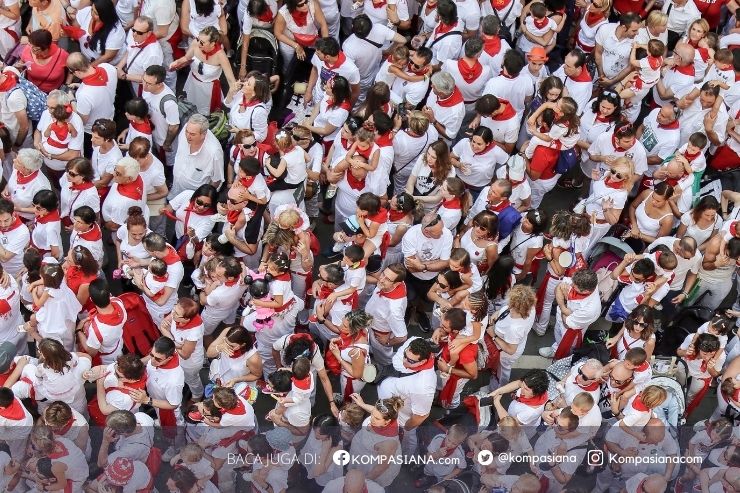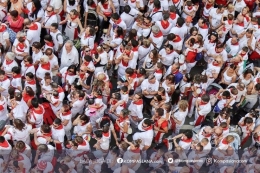Hindi Brihaspathi Sudana
Student of Fakultas Hukum Universitas Gadjah Mada
International Undergraduate Program
I. The Loopholes:
Basically, In Indonesia, an inter-religion marriage is so difficult to conduct because there is no regulation that explicitly regulates about that, so there will be a loophole. According to Law no 1 of 1974 regarding marriage, a marriage is legitimate, if it was conducted in accordance with the provisions of each religion. General interpretation of this problem arguing that, by this regulation an inter-religion marriage in Indonesia can’t be conducted legally. But practically, there are still lots of inter-religion marriages that have been conducted by these ways:
1. Conducting marriage abroad
According to the article 56 in Law no. 1 of 1974, which regulate the marriage that conducted abroad, a marriage can be conducted between Indonesian citizen, and it’s legitimate if the marriage is conducted in accordance with the law that prevails in that country. So, it means that an inter-religion marriage can be done legally by married abroad, in the country that allowing an inter-religion marriage. After back again to Indonesia, they can register their marriage certificate to the Civil Registry Office (KCS), which means, their marriage is legitimate because it has been registered to Civil Registry Office (KCS).
2. Converting to the other’s religion
This is the most common way that has been conducted. Before the marriage conducted, one of the couple will convert his/her religion into his/her partner’s religion. So, legally, they’re not conducting an inter-religion marriage but, they conducting a marriage with a same religion. After the marriage, and got the marriage certificate, one of them will convert back to his/her old religion.
3.By the assistance of the religious institution
The basic law of marriage in Indonesia, Law no. 1 of 1974, in article 2, actually doesn’t said that inter-religion marriage is prohibited, it just said that a legitimate marriage is a marriage that in accordance with the provisions of each religion. Before it will be registered, there is a religious-ceremonial marriage first and it is under the authority of every religious institution, depends on its marriage. This religious institution, that has the authority to decide whether a marriage is legal by the perspective of religion or not. If it’s legal so the marriage will be registered. In the matter of inter-religion marriage, apart from its religion-debatable-opinion, if a religious institution agreed to conduct an inter-religion marriage and legalize it, so the state shall registered it because, even national law, the legitimate marriage is depends on its religion-ceremonial marriage and it set by the religious institution.[1]
Request a court decision, last conducted in 1986, where Andi Vonny Gani as the applicant. There is a jurisprudence of Supreme Court decision which is Supreme Court Decision No. 1400K/Pdt/1986.[2] This decision stated that, Civil Registry Office (KCS) at that time allowed to conducting an inter-religion marriage. This case started when Andi Vonny Gani (women/Christian) as the applicant, want to married with Andrianus Petrus Hendrik Nelwan (men/Christian). In their consideration, Supreme Court stated that by the filling of petition for conduct the marriage to the chief of Civil Registry Office (KCS), should be interpreted that the applicant intends to conduct a marriage is not as a Islamic marriage. So, in that condition, Civil Registry Office, as the only institution that has the authority to conduct a marriage for non-islamic marriage, should approve the applicant. So, there is a possibility.
Interfaith Marriage Registration (Chatolic Institution-St. Antonius Church Case)
Officials of the Population and Civil Registry Office said that the office only accepts and records the testimony from religious institutions, in Sak Liung and Friska’s case, the church. According to Martinus Agus Hutoro, the chief of Marriage and Divorce Services section and Joko Setiadi, the chief of Development and Data System Maintenance section (both from the Civil Registry Office), the office has no problem if the groom and the bride have different religious backgrounds as written in their identity cards as long as there is a testimony from a religious institution that it has officiated their wedding ceremony, because the purpose of the civil registry office is just register marriage that has been legitimate or legal by the religious authority. Based on the couple’s story, the religious institution plays the important role in making an inter-religion marriage possible.[3]
[1] http://www.hukumonline.com/klinik/detail/cl290/kawin-beda-agama-menurut-hukum-indonesia
[2] http://putusan.mahkamahagung.go.id/putusan/23324
[3] http://magdalene.co/news-494-interfaith-marriage-is-possible-in-indonesia.html
Baca konten-konten menarik Kompasiana langsung dari smartphone kamu. Follow channel WhatsApp Kompasiana sekarang di sini: https://whatsapp.com/channel/0029VaYjYaL4Spk7WflFYJ2H







